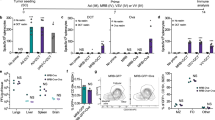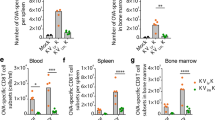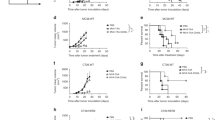Abstract
The human colorectal carcinoma (CRC)-associated GA733 antigen (Ag), also named CO17-1A/EpCAM/KSA/KS1-4, has been a useful target in passive immunotherapy of CRC patients with monoclonal antibody (mAb) and in active immunotherapy with anti-idiotypic antibodies or with recombinant protein. These approaches have targeted single epitopes (monoclonal anti-GA733 antibodies and anti-idiotypic antibodies) or extracellular domain epitopes (recombinant protein), primarily by B cells. To determine whether a reagent that induces immunity to a larger number of both B- and T-cell epitopes might represent a superior vaccine, we analyzed the capacity of full-length GA733 Ag expressing multiple potentially immunogenic epitopes and encoded by recombinant vaccinia virus (VV GA733-2) to induce humoral, cellular, and/or protective immunity in mice. VV GA733-2 induced Ag-specific antibodies that reacted predominantly to unknown epitopes on the Ag and lysed Ag-positive CRC targets in conjunction with murine peritoneal macrophages as effector cells. Immunized mice developed Ag-specific, proliferative and delayed-type hypersensitive lymphocytes. VV GA733-2 inhibited growth of ras-transformed syngeneic tumor cells expressing the human GA733 Ag in mice. These results suggest the potential of VV GA733-2 as a candidate vaccine for patients with CRC, possibly in combination with recombinant GA733-2–expressing adenovirus, which has been shown to induce cytolytic antibodies and T cells as well as tumor protective effects in mice. The combined vaccine approach may be superior to the use of either vaccine alone in patients who are pre-immune to both viruses.
This is a preview of subscription content, access via your institution
Access options
Subscribe to this journal
Receive 12 print issues and online access
$259.00 per year
only $21.58 per issue
Buy this article
- Purchase on Springer Link
- Instant access to full article PDF
Prices may be subject to local taxes which are calculated during checkout






Similar content being viewed by others
References
Herlyn M, Steplewski Z, Herlyn D et al. Colorectal carcinoma-specific antigen: detection by means of monoclonal antibodies Proc Natl Acad Sci USA 1979 76: 1438–1442
Herlyn D, Herlyn M, Ross AH et al. Efficient selection of human tumor growth-inhibiting monoclonal antibodies J Immunol Methods 1984 73: 157–167
Ross AH, Herlyn D, Iliopoulos D et al. Isolation and characterization of a carcinoma-associated antigen Biochem Biophys Res Commun 1986 135: 297–303
Göttlinger HG, Funke I, Johnson JP et al. The epithelial cell surface antigen 17-1A, a target for antibody-mediated tumor therapy: its biochemical nature, tissue distribution and recognition by different monoclonal antibodies Int J Cancer 1986 38: 47–53
Herlyn M, Steplewski Z, Herlyn D et al. CO17-1A and related monoclonal antibodies: their production and characterization Hybridoma 1986 5: Suppl S3–S10
Shetye J, Frödin J-E, Christensson B et al. Immunohistochemical monitoring of metastatic colorectal carcinoma in patients treated with monoclonal antibodies (MAb 17-1A) Cancer Immunol Immunother 1988 27: 154–162
Shetye J, Christensson B, Rubio C et al. The tumor-associated antigens BR55-2, GA73-3, and GICA 19-9 in normal and corresponding neoplastic human tissues, especially gastrointestinal tissues Anti-Cancer Res 1989 9: 395–404
Sears HF, Herlyn D, Herlyn M et al. Ex vivo perfusion of a tumor-containing colon with monoclonal antibody J Surg Res 1981 31: 145–150
Sears HF, Herlyn D, Herlyn M et al. Ex vivo perfusion of human colon with monoclonal anti-colorectal cancer antibodies Cancer 1982 49: 1231–1235
Mach J-P, Chatal J-F, Lumbroso J-D et al. Tumor localization in patients by radiolabeled monoclonal antibodies against colon carcinoma Cancer Res 1983 43: 5593–5600
Powe J, Herlyn D, Alavi A et al. Radioimmunodetection of human tumor xenografts by monoclonal antibodies correlates with antibody density and affinity In: Button K, Donato L, eds Immunoscintigraphy New York: Gordon & Breach Science Publishers 1985 135–152
LoBuglio AF, Saleh MN, Lee J et al. Phase I trial of multiple large doses of murine monoclonal antibody CO17-1A. I. Clinical aspects J Natl Cancer Inst 1988 80: 932–936
Riethmüller G, Holtz E, Schlimok G et al. Monoclonal antibody therapy for resected Dukes' C colorectal cancer: seven-year outcome of a multicenter randomized trial J Clin Oncol 1998 16: 1788–1794
Herlyn D, Wettendorff M, Schmoll E et al. Anti-idiotype immunization of cancer patients: modulation of the immune response Proc Natl Acad Sci USA 1987 84: 8055–8059
Loibner H, Plot R, Rot A et al. Immunoreactivity of patient with colorectal cancer metastasis after immunization with anti-idiotypes Lancet 1990 335: 171
Herlyn D, Benden A, Kane M et al. Anti-idiotype cancer vaccines: preclinical and clinical studies In Vivo 1991 5: 615–624
Herlyn D, Harris D, Zaloudik J et al. Immunomodulatory activity of monoclonal anti-idiotypic antibody to anti-colorectal carcinoma antibody CO17-1A in animals and patients J Immunother 1994 15: 303–311
Somasundaram R, Zaloudik J, Jacob L et al. Induction of T- and B-cell immunity in colon carcinoma patients by anti-idiotypic antibody J Immunol 1995 155: 3253–3261
Maruyama H, Zaloudik J, Li W et al. Point and counterpoint. Cancer vaccines: single epitope anti-idiotype vaccine versus multiple epitope antigen vaccine Cancer Immunol Immunother 2000 49: 123–132
Strassburg CP, Kasai Y, Seng BA et al. Baculovirus recombinant expressing a secreted form of a trans-membrane carcinoma-associated antigen Cancer Res 1992 52: 815–821
Staib L, Birebent B, Somasundaram R et al. Immunogenicity of recombinant GA733-2E antigen (CO17-1A, EGP, KS1-4, KSA, Ep-CAM) in gastrointestinal carcinoma patients Cancer Gene Ther 2002 9: 142–148
Szala S, Froehlich M, Scollon M et al. Molecular cloning of cDNA for the carcinoma-associated antigen GA733-2 Proc Natl Acad Sci USA 1990 87: 3542–3546
Bergsagel PL, Victor-Kobrin C, Timblin CR et al. A murine cDNA encodes a pan-epithelial glycoprotein that is also expressed on plasma cells J Immunol 1992 148: 590–596
Zaloudik J, Basak S, Nesbit M et al. Expression of an antigen homologous to the human CO17-1A/GA733 colon cancer antigen in animal tissues Br J Cancer 1997 76: 909–916
Land H, Parada LF, Weinberg RA . Tumorigenic conversion of primary embryo fibroblasts requires at least two cooperating oncogenes Nature 1983 304: 596–602
Maruyama H, Benden A, Li W et al. Monoclonal anti-idiotypic antibody functionally mimics the human gastrointestinal carcinoma epitope GA733 Int J Cancer 1996 65: 547–553
Herlyn M, Balaban G, Bennicelli J et al. Primary melanoma cells of the vertical growth phase: similarities to metastatic cells J Natl Cancer Inst 1985 74: 283–289
Koprowski H, Steplewski Z, Mitchell K et al. Colorectal carcinoma antigens detected by hybridoma antibodies Somatic Cell Genet 1979 5: 957–972
Kieny MP, Lathe R, Drillien R et al. Expression of rabies virus glycoprotein from a recombinant vaccinia virus Nature 1984 312: 163–166
Li W, Berencsi K, Basak S et al. Human colorectal cancer (CRC) antigen CO17-1A/GA733 encoded by recombinant adenovirus inhibits growth of established CRC cells in mice J Immunol 1997 159: 763–769
Herlyn D, Koprowski H . IgG2a monoclonal antibodies inhibit human tumor growth through interaction with effector cells Proc Natl Acad Sci USA 1982 79: 4761–4765
Powe J, Herlyn D, Alavi A et al. Radioimmunodetection of human tumor xenografts by monoclonal antibodies correlates with antibody density and affinity In: Button K, Donato L, eds Immunoscintigraphy New York: Gordon & Breach Science Publishers 1985 135–152
Zhai Y, Yang JC, Kawakami Y et al. Antigen-specific tumor vaccines J Immunol 1996 156: 700–710
Houghton AN . On course for a cancer vaccine Lancet 1995 345: 1384–1385
Townsend ARM, Rothbard J, Gotch FM et al. The epitopes of influenza nucleoprotein recognized by cytotoxic T lymphocytes can be defined with short synthetic peptides Cell 1986 44: 959–968
Kantor J, Irvine K, Abrams S et al. Antitumor activity and immune responses induced by a recombinant carcinoembryonic antigen–vaccinia virus vaccine J Natl Cancer Inst 1992 84: 1084–1091
Estin CD, Stevenson US, Plowman GD et al. Recombinant vaccinia virus vaccine against the human melanoma antigen p97 for use in immunotherapy Proc Natl Acad Sci USA 1988 85: 1052–1056
Irvine KR, Chamberlain RS, Shulman EP et al. Enhancing efficacy of recombinant anticancer vaccines with prime/boost regimens that use two different vectors J Natl Cancer Inst 1997 89: 1595–1601
Hodge JW, McLaughlin JP, Kantor JA et al. Diversified prime and boost protocols using recombinant vaccinia virus and recombinant non-replicating avian pox virus to enhance T-cell immunity and antitumor responses Vaccine 1997 15: 759–768
Grosenbach DW, Barrientos JC, Schlom J et al. Synergy of vaccine strategies to amplify antigen-specific immune responses and antitumor effects Cancer Res 2001 61: 4497–4505
Bei R, Kantor J, Kashmiri SVS et al. Enhanced immune responses and anti-tumor activity by baculovirus recombinant carcinoembryonic antigen (CEA) in mice primed with the recombinant vaccinia CEA J Immunother 1994 16: 275–282
Wang M, Bronte V, Chen PW et al. Active immunotherapy of cancer with a nonreplicating recombinant fowlpox virus encoding a model tumor-associated antigen J Immunol 1995 154: 4685–4692
Acres RB, Hareuveni M, Balloul J-M et al. Vaccinia virus MUC1 immunization of mice: immune response and protection against the growth of murine tumors bearing the MUC1 antigen J Immunother 1993 14: 136–143
Bronte V, Tsung K, Rao JB et al. IL-2 enhances the function of recombinant poxvirus-based vaccines in the treatment of established pulmonary metastases J Immunol 1995 154: 5282–5292
McLaughlin JP, Schlom J, Kantor JA et al. Improved immunotherapy of a recombinant carcinoembryonic antigen vaccinia vaccine when given in combination with interleukin-2 Cancer Res 1996 56: 2361–2367
Schlom J, Kantor J, Abrams S et al. Strategies for the development of recombinant vaccines for the immunotherapy of breast cancer Breast Cancer Res Treat 1996 38: 27–39
Acres B, Apostolopoulos V, Balloul JM et al. MUC1-specific immune responses in human MUC1 transgenic mice immunized with various human MUC1 vaccines Cancer Immunol Immunother 2000 48: 588–594
Kass E, Schlom J, Thompson J et al. Induction of protective host immunity to carcinoembryonic antigen (CEA), a self-antigen in CEA transgenic mice, by immunizing with a recombinant vaccinia–CEA virus Cancer Res 1999 59: 676–683
Mosmann TR, Coffman RL . Th1 and Th2 cells: different patterns of lymphokine secretion lead to different functional properties Annu Rev Immunol 1989 7: 145–173
Suzuki M, Iwashiro M, Takatsuki F et al. Reconstitution of anti-tumor effects of lentinan in nude mice: roles of delayed-type hypersensitivity reaction triggered by CD4-positive T-cell clone in the infiltration of effector cells into tumor Jpn J Cancer Res 1994 85: 409–417
Bernards R, Destree A, McKenzie S et al. Effective tumor immunotherapy directed against an oncogene-encoded product using a vaccinia virus vector Proc Natl Acad Sci USA 1987 84: 6854–6858
Hareuveni M, Gautier C, Kieny M-P et al. Vaccination against tumor cells expressing breast cancer epithelial tumor antigen Proc Natl Acad Sci USA 1990 87: 9498–9502
Meneguzzi G, Kieny MP, Lecocq J-P et al. Vaccinia recombinants expressing early bovine papilloma virus (PBV1) proteins: retardation of BPV1 tumour development Vaccine 1990 8: 199–204
Ito T, Wang D-Q, Maru M et al. Antitumor efficacy of vaccinia virus-modified tumor cell vaccine Cancer Res 1990 50: 6915–6918
Meneguzzi G, Cerni C, Kieny MP et al. Immunization against human papillomavirus type 16 tumor cells with recombinant vaccinia viruses expressing E6 and E7 Virology 1991 81: 62–69
Irvine KK, Abrams S, Snoy P et al. Immunogenicity and safety of a recombinant vaccinia virus vaccine expressing the carcinoembryonic antigen gene in a nonhuman primate Cancer Res 1992 52: 6917–6925
Lathe R, Kieny MP, Gerlinger P et al. Tumour prevention and rejection with recombinant vaccinia Nature 1987 326: 878–880
Lin K-Y, Guarnieri FG, Staveley-O'Carroll KF et al. Treatment of established tumors with a novel vaccine that enhances major histocompatibility class II presentation of tumor antigen Cancer Res 1996 56: 21–26
Chamberlain RS, Carroll MW, Bronte V et al. Costimulation enhances the active immunotherapy effect of recombinant anticancer vaccines Cancer Res 1996 56: 2832–2836
Rao JB, Chamberlain RS, Bronte V et al. IL-12 is an effective adjuvant to recombinant vaccinia virus-based tumor vaccines J Immunol 1996 156: 3357–3365
Overwijk WW, Lee DS, Surman DR et al. Vaccination with a recombinant vaccinia virus encoding a “self” antigen induces autoimmune vitiligo and tumor cell destruction in mice: requirement for CD4(+) T lymphocytes Proc Natl Acad Sci USA 1999 16: 2982–2987
McCabe BJ, Irvine KR, Nishimura MI et al. Minimal determinant expressed by a recombinant vaccinia virus elicits therapeutic antitumor cytolytic T lymphocyte responses Cancer Res 1995 55: 1741–1747
Kaufman H, Schlom J, Kantor J . A recombinant vaccinia virus expressing human carcinoembryonic antigen (CEA) Int J Cancer 1991 48: 900–907
Rosales C, Graham VV, Rosas GA et al. A recombinant vaccinia virus containing the papilloma E2 protein promotes tumor regression by stimulating macrophage antibody-dependent cytotoxicity Cancer Immunol Immunother 2000 49: 347–360
Spicer AP, Parry G, Patton S et al. Molecular-cloning and analysis of the mouse homolog of the tumor-associated mucin, MUC1, reveals conservation of potential O-glycosylation sites, transmembrane, and cytoplasmic domains and a loss ofminisatellite-like polymorphism J Biol Chem 1991 266: 15099–15109
Beauchemin N, Turbide C, Afar D et al. A mouse analogue of the human carcinoembryonic antigen Cancer Res 1989 49: 2017–2021
Conry RM, Khazaeli MB, Saleh MN et al. Phase I trial of a recombinant vaccinia virus encoding carcinoembryonic antigen in metastatic adenocarcinoma: comparison of intradermal versus subcutaneous administration Clin Cancer Res 1999 5: 2330–2337
Eder JP, Kantoff PW, Roper K et al. A phase I trial of a recombinant vaccinia virus expressing prostate-specific antigen in advanced prostate cancer Clin Cancer Res 2000 6: 1632–1638
Conry RM, Allen KO, Lee S et al. Human autoantibodies to carcinoembryonic antigen (CEA) induced by a vaccinia–CEA vaccine Clin Cancer Res 2000 6: 34–41
Tsang K, Zaremba Y, Nieroda S et al. Generation of human cytotoxic T cells specific for human carcinoembryonic antigen epitopes from patients immunized with recombinant vaccinia–CEA vaccine J Natl Cancer Inst 1995 87: 949–990
Cooney EL, Collier AC, Greenberg PD et al. Safety of an immunological response to a recombinant vaccinia virus vaccine expressing HIV envelope glycoprotein Lancet 1991 337: 567–572
Acknowledgements
This work was supported in part by Grants CA 10815, CA 60595, CA 74294, and CA 29797 from the National Institutes of Health, and a grant from Ajinomoto, Japan. We thank Dr Eva Gönczöl for critically reviewing this manuscript.
Author information
Authors and Affiliations
Corresponding author
Rights and permissions
About this article
Cite this article
Zaloudik, J., Li, W., Jacob, L. et al. Inhibition of tumor growth by recombinant vaccinia virus expressing GA733/CO17-1A/EpCAM/KSA/KS1-4 antigen in mice. Cancer Gene Ther 9, 382–389 (2002). https://doi.org/10.1038/sj.cgt.7700452
Published:
Issue Date:
DOI: https://doi.org/10.1038/sj.cgt.7700452
Keywords
This article is cited by
-
Immunotherapeutic effects of recombinant colorectal cancer antigen produced in tomato fruits
Scientific Reports (2022)
-
Frequent high-level expression of the immunotherapeutic target Ep-CAM in colon, stomach, prostate and lung cancers
British Journal of Cancer (2006)
-
Immunization with a plant-produced colorectal cancer antigen
Cancer Immunology, Immunotherapy (2004)
-
Novel therapeutic strategies in prostate cancer management using gene therapy in combination with radiation therapy
World Journal of Urology (2003)



